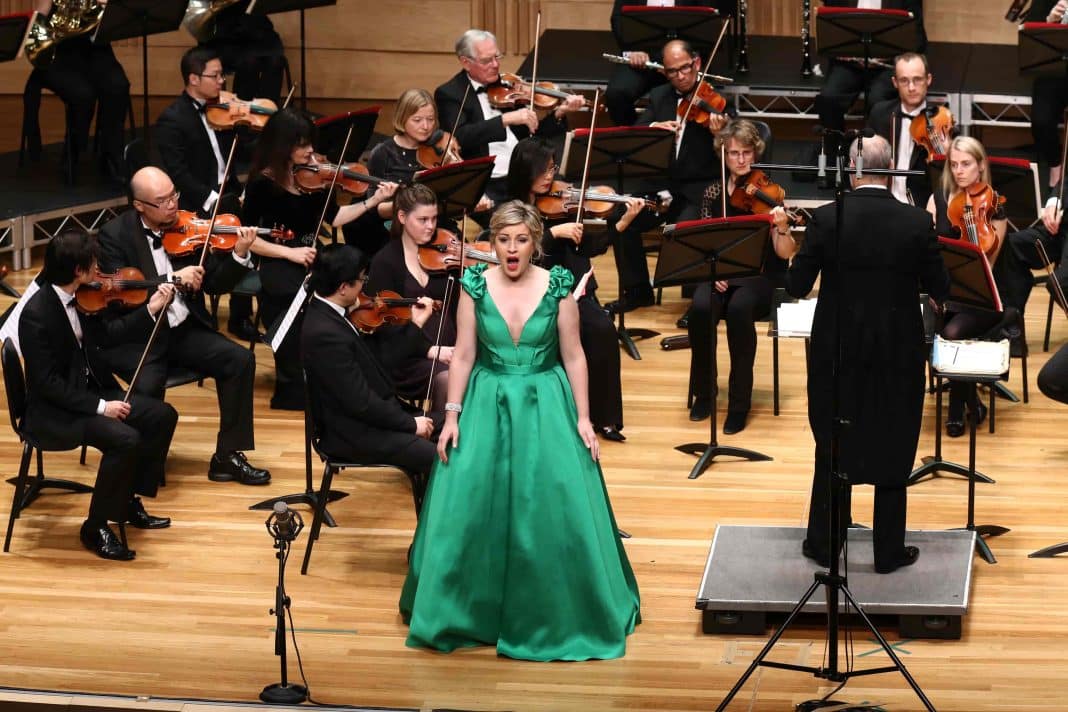National Opera’s Gala concert later this month will lift the roof with incredibly exciting singing of glorious music, the company’s artistic director and producer, baritone Peter Coleman-Wright, proclaims. There will be three Canberra divas; the lush, dramatic music of Verdi, Wagner, and Richard Strauss; and some of opera’s grandest, most rousing choruses.
The start of the night is soprano Eleanor Greenwood, who performed the role of Annio in National Opera’s acclaimed début production, Mozart’s Clemenza di Tito (1791), last year.
Greenwood will sing “Dich, teure Halle”, Elisabeth’s greeting to the hall, from Wagner’s Tannhäuser (1845), a grand opera about courtly and profane love in mediaeval Germany, and perhaps his most tuneful work (less “endless melody” than an unstoppable series of melodies); the Easter Hymn and chorus from Cavalleria rusticana (1890), Mascagni’s verismo thriller of adultery and revenge in Sicily; and Leonora’s “Pace, pace, mio Dio”, from Verdi’s La Forza del destino (1862), a sprawling, kaleidoscopic opera of ideas – chiefly the role chance (or fate) plays in our lives – teeming with soldiers, monks, and camp followers.
An artist with Opera Queensland and Melbourne Opera, Greenwood has recently appeared in Wagner’s Walküre (1870) – singing the incestuous heroine Sieglinde – and Verdi’s Macbeth (1847).
“It is time for Canberra to hear her development,” Coleman-Wright said. “It will be a wonderful opportunity for people to hear her again.”
- National Opera brings Mozart, music, and magic to Canberra (20 June 2021)
- Canberra’s new National Opera has ‘ridden the storm’ (5 April 2021)
- ‘Trouser roles’ are Catherine Carby’s forte (4 April 2021)
- National Opera will put Canberra on the international music map (11 December 2020)
Greenwood will be joined by Canberran sopranos Hannah Carter and Emma Mauch in the sublime trio-finale from Strauss’s Rosenkavalier (1911), a silvery magical piece in which the middle-aged Marschallin bids farewell to her much younger lover Octavian.
Carter and Mauch, trained music graduates, work as a speech pathologist and midwife respectively, but Carter will move to the UK later this year to pursue her singing dreams.
They will sing a duet from another Strauss work, Arabella (1933), a lighter work of balls, keys, transvestites, strapping Croatians, and glasses of water.
Coleman-Wright likens the singers’ voices to wine: Greenwood, a spinto soprano (a heavy, rich voice), is a shiraz; Mauch, a lyric soprano, is a cabernet sauvignon; and Carter, a light lyric soprano, is a merlot.
To go with the wines, a chorus of 50 local singers – “the people who love to sing in Canberra” – will perform some favourite choruses: Verdi’s Hebrew (Nabucco, 1842) and Anvil Choruses (Il Trovatore, 1853), the Bridal Chorus from Wagner’s Lohengrin (1850), the Humming Chorus from Puccini’s Madama Butterfly (1904), the Bell Chorus from Leoncavallo’s Pagliacci (1892), and the Champagne Chorus from Johann (no relation) Strauss’s Fledermaus (1874).
National Opera’s plans for this year have suffered due to coronavirus – Puccini’s Rondine (1917) has been shelved – but the company will return later this year with a fully staged performance of Handel’s opera seria, Alcina (1735).
The two performances will be dedicated to Australia’s legendary Joan Sutherland, “La Stupenda”, who made her La Fenice début in the role, and to her husband, conductor Richard Bonynge, National Opera’s patron.
Coleman-Wright has assembled one of the best casts available in Australia right now, conducted by the brilliant Handelian expert Graham Abbott.
“All the elements are in place for something very special,” Coleman-Wright said.
In fact, he believes National Opera could be something very special for Canberra, and indeed for Australia.
“There’s been a lot of talk about Canberra becoming the cultural capital of Australia – and you can’t really have a cultured city without a major opera company.”
Opera Gala, Saturday 27 August 7.30pm. Tickets: $120 (A reserve), $95 (B reserve); concession: $95 (A reserve), $80 (B reserve); accessible seating: $80; students: $45. Tickets are for sale via National Opera’s website.



